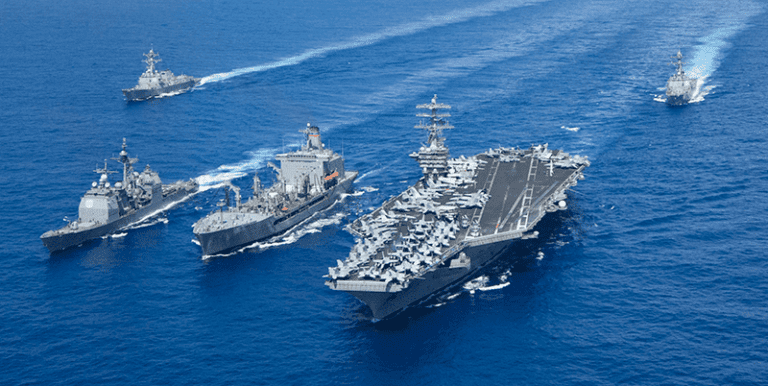
With the Trump Administration ending the waivers it granted on imports of Iranian oil and designating the Islamic Revolutionary Guard Corps (IRGC) a foreign terrorist organization, the Arabian Gulf region faces a period of increased tension and instability. This is exacerbated by perceived Iranian malign behavior around the region and reciprocal Saudi-Emirati counter-activism, most visibly in the war in Yemen. Thus far, no state inside or outside the region appears eager for a military conflagration with Iran, but the sharp rhetoric by all concerned betrays a sense of foreboding. From its side, Iran has often threatened to close the Strait of Hormuz, the passageway for a sizeable portion of global oil supplies, if it is disallowed from selling its hydrocarbon exports on the international market.
Arab Center Washington DC asked four of its resident and nonresident fellows to shed light on the possibility of a flareup between Iran and the United States and its regional allies. They agreed that given current conditions, the chance of a military confrontation with Iran is remote, although the sharp rhetoric and counter-accusations are likely to continue. Their analyses are below.
Imad K. Harb, Director of Research and Analysis, ACW
It is hard to consider that a war in the Arabian Gulf is in the offing despite recent tensions and the attendant rhetoric. It is even harder to imagine that anyone would think such a war would succeed in correcting whatever ails regional relations between Iran and the opposing Gulf Arab states—specifically Saudi Arabia and the United Arab Emirates—or Iran and the United States. Of concern is a dangerous mix of acrimony, mutual threats and accusations, and grandstanding, especially between American and Iranian officials. But the stakes of a military conflict are too high to ignore in a region that currently has more than its share of instability and bloodshed.
Indeed, the negative repercussions of such a development on the states of the Gulf, including Iran, would be profound; there is no question that a war would be devastating for the infrastructures, economies, and societies of Iran and its neighbors. The postwar conditions would also be unfathomable and dire, considering that once the shooting starts, it would undoubtedly escalate and involve the use of all kinds of formidable weapons.
Importantly, however, it should not be assumed that the parties concerned are eager for a war. While President Donald Trump may like to make bellicose announcements and to excite his domestic audience with martial tweets, neither he nor his political base likes foreign entanglements and their associated costs. As it is, the president is itching to bring American troops home from Syria, Iraq, and Afghanistan. Despite the bravado of Iranian officials, it is hard to imagine them wanting to be tested against the might of the American war machine. Saudi Arabia and the UAE are currently weighed down by a stalemated war in Yemen––and would be unwise to undertake another battle––and are suffering from difficult economic times to sustain both the current effort and a potential one. Finally, if Israel enters the fray, it may escape Iran’s direct retaliation but is most assuredly going to have to contend with Hezbollah on its border with Lebanon.
Daniel Brumberg, Nonresident Fellow, ACW
Given President Trump’s end to waivers on imports of Iranian oil, it seems that the prospects for armed conflict between the United States and Iran are increasing. The most likely venue would be the Strait of Hormuz which Iran continues to threaten to shut down. One can easily imagine some kind of a provocation––direct or perceived––from either side that might open the door to hostilities. A short and decisive military confrontation that would inflict a major cost on some element of Iran’s military or IRGC presence in the Gulf and/or in some other theater might also redound to Trump’s favor––illustrating for all to see (including his domestic base) what the “Make America Great Again” principle means in action.
Still, there are important reasons for why the current situation might not in fact lead to a military confrontation. First, a close examination of the Trump Administration’s record yields no coherent vision or strategy as to what it wants to achieve and, more importantly, what it is ready to do to realize its aims. Second, for this White House, there is a wide gap between rhetoric (especially Trump’s periodic bombastic pronouncements and tweets) and the administration’s will and capacity to take the measures and risks that are necessary for carrying out its threats. Trump’s domestic audience believes in avoiding military adventures that could have a huge and unpredictable economic cost.
Third, the United States and its allies in the region––especially Saudi Arabia, the UAE, and Israel––must show caution because Iran and Hezbollah can quickly retaliate against an attack. Specifically, Israel’s prime minister, Benjamin Netanyahu, is in the midst of forming a new government and he would likely wish to avoid a conflagration with Hezbollah. Finally, the Iranian leaders’ dialogue with the European Union on finding an alternative mechanism for selling oil prompts them to avoid direct military conflict, although they could certainly maintain their verbal attacks on the United States.
Abdulwahab Al-Qassab, Visiting Fellow, ACW
The danger of a war in the Arabian Gulf is remote because it is doubtful that Iran would find it feasible to close the Strait of Hormuz––despite Tehran’s many threats to do so if it is prevented from exporting its oil. As many Iranian officials have said, if the Islamic Republic is not permitted to trade then no other countries should be. But the Iranian decision on whether to close the strait is influenced by many factors such as the availability of alternative routes for other oil exporters, the quantities of oil exported, knowledge of what comes after the closure, and, importantly, the military capability to actually shut down the passage.
Only Iran, Kuwait, and Iraq (to some extent) are dependent on the strait for their exports. Having heard Iran’s many threats to close down Hormuz, Saudi Arabia and the United Arab Emirates have opted to find alternate routes. Since the Iraq-Iran war of 1980-1988, Saudi Arabia has built pipelines across its desert to the Yanbu oil platform on the Red Sea in the west. Abu Dhabi has bypassed the strait and built oil-exporting facilities along its coastline on the Gulf of Oman. Even Iraq can use an existing network of pipelines—or build new ones—that can carry its oil to Turkey, Saudi Arabia, and the Port of Aqaba in Jordan.
Indeed, Iran would be a net loser if it closes Hormuz and impedes the security of navigation through it. Besides, its military capabilities are not enough for it to close the strait and then defend it for an indeterminate period of time. On the other hand, if some renegade IRGC commander sees fit to wage an asymmetrical war, Iran should be ready to bear the consequences.
Kristian Coates Ulrichsen, Nonresident Fellow, ACW
The current escalation between the Trump Administration and Iran is unlikely to lead to war. Time and again, President Trump has failed to follow through on his rhetoric and he has shown himself unwilling to sanction the use of military force. The trajectory of his comments and actions on North Korea illustrate the president’s tendency to say one thing and do another, and while there is certainly a difference between the cases of North Korea and Iran, the president’s instincts will likely lead him to use the ratcheting up of rhetoric to secure more concessions from Iran and from other regional states. For example, he could make it clear to US partners in the Gulf that action cannot proceed while the Sunni Arab states remain divided; thus, Trump could press them first to end the GCC crisis, which began in 2017.
It may also be possible that the president’s oft-remarked fondness for the “Art of the Deal” and his self-proclaimed ability to get things done that have eluded others will mean that he continues to hope for a grand summit with Iran’s president—in a manner akin to his two meetings with North Korea’s Supreme Leader Kim Jong-un. Alternatively, the president may feel that by raising the temperature in relations with Iran he might be able to secure concessions for a “new” deal with Iran that he could proclaim (regardless of fact) to be “tougher” than the deal he inherited from the Obama Administration. Given that Trump does not appear to have strongly held fixed principles, and that getting one-up on his predecessors seems to matter to him, he may decide that raising the stakes without pulling the trigger keeps open his options of breaking through where others failed.




